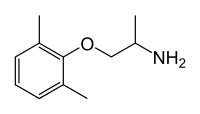Mexiletine
Mexiletine (INN) (sold under the trade names Mexitil and NaMuscla) is a drug used to treat abnormal heart rhythms, chronic pain, and some causes of muscle stiffness. Common side effects include abdominal pain, chest discomfort, drowsiness, headache, and nausea. It works as a non-selective voltage-gated sodium channel blocker and belongs to the Class IB group of anti-arrhythmic medications.
 | |
| Clinical data | |
|---|---|
| AHFS/Drugs.com | Monograph |
| MedlinePlus | a607064 |
| Pregnancy category | |
| Routes of administration | Oral, IV |
| ATC code | |
| Legal status | |
| Legal status |
|
| Pharmacokinetic data | |
| Bioavailability | 90% |
| Protein binding | 50-60% |
| Metabolism | Hepatic (CYP2D6 and 1A2- mediated) |
| Elimination half-life | 10-12 hours |
| Excretion | Renal (10%) |
| Identifiers | |
IUPAC name
| |
| CAS Number | |
| PubChem CID | |
| IUPHAR/BPS | |
| DrugBank | |
| ChemSpider | |
| UNII | |
| KEGG | |
| ChEBI | |
| ChEMBL | |
| CompTox Dashboard (EPA) | |
| ECHA InfoCard | 100.046.190 |
| Chemical and physical data | |
| Formula | C11H17NO |
| Molar mass | 179.259 g/mol g·mol−1 |
| 3D model (JSmol) | |
| Chirality | Racemic mixture |
SMILES
| |
InChI
| |
| (verify) | |
Medical uses
Mexiletine has several uses including the treatment of abnormal heart rhythms or arrhythmias, chronic pain, and myotonia.
In general when treating arrhythmias, mexiletine is reserved for use in dangerous heart rhythm disturbances such as ventricular tachycardia.[2] It is of particular use when treating arrhythmias caused by long QT syndrome.[3] The LQT3 form of long QT syndrome is amenable to treatment with mexiletine as this form is caused by defective sodium channels that continue to release a sustained current rather than fully inactivating, however other forms of long QT syndrome can also be treated with this medication.[3]
Mexiletine has been used to treat chronic pain and may also be used to treat muscle stiffness resulting from myotonic dystrophy (Steinert's disease) or nondystrophic myotonias such as myotonia congenita (Thomsen syndrome or Becker syndrome).[4][5]
Adverse effects
Common side effects of mexiletine include abdominal pain, chest discomfort, drowsiness, headache, nausea and skin reactions.[6] Uncommon or rare side effects include seizures and liver dysfunction.[6]
Pharmacology
Mexiletine is an oral analogue of lidocaine.[5] It is a class IB antiarrhythmic which prolongs the refractory period by delaying the recovery from inactivation of sodium channels responsible for phase 0 of the cardiac action potential.[2] The drug has a bioavailability of 90%, and peak plasma concentrations are seen after 2–4 hours.[2] The mean drug half-life is approximately 11 hours.[2] Mexiletine is predominantly metabolised by the liver. The pharmacokinetics of mexiletine are preserved with even moderate to severe renal impairment, but dose adjustment may be required when creatinine clearance falls below 10 mL/minute.[2]
Synthesis

Society and culture
Mexiletine is available for human use in the US, and has been reintroduced in the UK as a licensed product, having previously only been available as a 'named patient' import. The drug is sold under the trade name Mexitil for use in arrhythmias and NaMuscla for use in myotonia.[8][9]
Veterinary uses
Mexiletine is available to veterinarians in the US for the treatment of heart disease in dogs and cats.
References
- Manolis, A. S.; Deering, T. F.; Cameron, J.; Estes, N. A. (May 1990). "Mexiletine: pharmacology and therapeutic use". Clinical Cardiology. 13 (5): 349–359. doi:10.1002/clc.4960130509. ISSN 0160-9289. PMID 2189614.
- Li, Guoliang; Zhang, Li (November 2018). "The role of mexiletine in the management of long QT syndrome". Journal of Electrocardiology. 51 (6): 1061–1065. doi:10.1016/j.jelectrocard.2018.08.035. ISSN 1532-8430. PMID 30497731.
- Romman, Adam; Salama-Hanna, Joseph; Dwivedi, Samvid (September 2018). "Mexiletine Usage in a Chronic Pain Clinic: Indications, Tolerability, and Side Effects". Pain Physician. 21 (5): E573–E579. ISSN 2150-1149. PMID 30282405.
- Sweetman S (ed.) (2002). Martindale: The complete drug reference (33rd ed.). London: Pharmaceutical Press. ISBN 0-85369-499-0.CS1 maint: extra text: authors list (link)
- "British National Formulary - Mexiletine". NICE. Retrieved 2019-06-17.
- H. Koppe, W. Kummer, U.S. Patent 3,954,872 (1976).
- "Mexiletine". www.drugbank.ca. Retrieved 2019-06-17.
- "Lupin announces launch of NaMuscla". www.biospectrumindia.com. Retrieved 2019-06-17.
Further reading
- Peck T, Hill S, Williams M, eds. (2004). Pharmacology for Anaesthesia and Intensive Care (2nd ed.). Cambridge University Press. ISBN 0-521-68794-2.